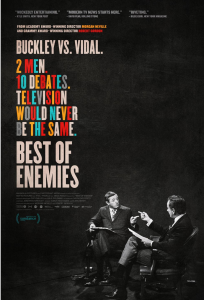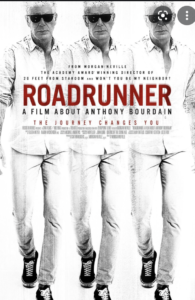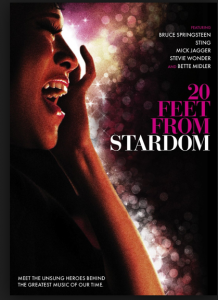***
Best of Enemies
The 1968 democratic political convention was held in Chicago in a year filled with violence, political turmoil, and civil unrest. Lyndon Johnson decided not to run for president because of the controversy over the Vietnam for war. His Vice President Hubert Humphrey won the nomination beating anti-war spokesperson Eugene McCarthy. In the Republican Convention in Miami, Florida, former Vice President Richard Nixon beat Ronald Reagan for the nomination and went on to win the election. One of the memorable aspects of this political year was a series of 10 debates between William F. Buckley Jr., conservative spokesperson and Gore Vidal, liberal spokesperson that was aired on the ABC television network during the political convention. It is these debates that are the subject of this thought provoking and revealing documentary film produced and directed by Morgan Neville and Robert Gordon. It is ironic that when ABC made the decision to inject the debates into its TV coverage of the conventions, they were number three in the ratings and were a poor number three at that. Yet, their use of these debates propelled them to the highest ratings over the other two networks who were doing gavel-to-gavel convention coverage. This is probably the beginning of the type of news coverage which we see today which is filled with pundits discussing and debating the news on many different networks.
In 1968, there was no more well known spokesperson of the conservative points of view than William F. Buckley Jr. For many years he had a popular television program “Firing Line†where he took on people with opposing views and demonstrated his brilliance. He also was a columnist for well-known conservative magazines. Gore Vidal was an equally brilliant, articulate liberal spokesperson who not only spoke “the talk†but wrote many very successful books about American history and also penned successful novels including one well-known fiction work titled Myra Breckinridge.
As we see in this 87-minute documentary film edited by Eileen Meyer and Aaron Wickenden, these 10 debates were very fascinating to watch and were watched more than for the discussion about the conflicts of ideological viewpoints. Certainly, Buckley expressed his view that people should be more self-sufficient and shouldn’t depend on government handouts. Vidal made the point that the government has responsibility to support people in need. However, the essence of this historic debate was how these brilliant men try to take apart not only each other’s arguments but each other.
We didn’t see all the raw footage of the debate, but in a post-film discussion with Mr. Neville, one, of the director producers, he shared his analysis which counted that more than three quarters of the time, these men were trying to dissect each other, rather than carrying on a rational discussion of the complicated issues of their time. One can’t help reflect how this film reminds us that this may be how we are approaching our modern day political debates as the right and left trash each other.
It of course makes great television and there have been very few more exciting moments in live widely watched television than the culminating mutual attacks on each other that occurred in the Buckley-Vidal debates. There needs to be no “spoiler alert†here since the following moments which we will describe are well-explored in this documentary. Mr. Buckley compared the anti-war protesters (who were probably demonstrating at that very moment outside the convention hall) “to be bullying fascists.†Vidal then says, “The only pro or crypto-Nazi I can think of is yourself.†Buckley then uncharacteristically loses his temper and says, “Listen you queer, stop calling me a crypto-Nazi or I’ll sock you in your goddamn face and you’ll stay plastered.†(The fact that Vidal turned out to be “gay†was completely irrelevant especially since he was not out at that time and Buckley had used a very disparaging word in reference to him.) Another irony is that at the very moment that Buckley threatened to punch Vidal, the police outside were probably punching the protesters. In any case this documentary film gives an inside view of the meaning of this debate using commentary of people who knew the two men at that time and later in life. We learned that Vidal’s feelings and comments about Buckley, even at the time of Buckley’s death were as angry and as bitter as ever. Similarly, Buckley’s people who knew him suggest that Buckley never got over his feelings about Vidal.
A good documentary film not only presents the facts but also tries to put them in some kind of perspective. To a certain degree, the filmmakers here may have succeeded. You may need to be a student of television and politics to fully appreciate how the debate may have been a turning point in how such debates are handled in the modern media. However, if you step back you can perhaps see that our current political discourse in 2015 over ideological differences, may be getting very personal. This film presents a worthwhile lesson in these situations of what can go wrong between “The Best of Enemies.â€
 Morgan Neville, veteran documentary filmmaker, has just come out with a new documentary about author, TV host, food expert, and documentary filmmaker Anthony Bourdain who has been featured on CNN with his very popular series about food around the world. He has interviewed and interacted with people from all four corners of the earth. We had the opportunity to preview this film and see an interview with the filmmaker by Steve Farber as part of his series Reel Talk. Bourdain had a way with connecting with people from numerous countries and cultures, albeit frequently around food. He had two marriages and one daughter, but we are told that he was away from home 270 days of the year, which says a lot about his family relationships. The film also suggests that a troubled relationship with a girlfriend actress, may have contributed to his final spiral out of control which led to his suicide at age 61. Although the film leaves many unanswered questions about this brilliant and enigmatic man, it is interesting and worth seeing.
Morgan Neville, veteran documentary filmmaker, has just come out with a new documentary about author, TV host, food expert, and documentary filmmaker Anthony Bourdain who has been featured on CNN with his very popular series about food around the world. He has interviewed and interacted with people from all four corners of the earth. We had the opportunity to preview this film and see an interview with the filmmaker by Steve Farber as part of his series Reel Talk. Bourdain had a way with connecting with people from numerous countries and cultures, albeit frequently around food. He had two marriages and one daughter, but we are told that he was away from home 270 days of the year, which says a lot about his family relationships. The film also suggests that a troubled relationship with a girlfriend actress, may have contributed to his final spiral out of control which led to his suicide at age 61. Although the film leaves many unanswered questions about this brilliant and enigmatic man, it is interesting and worth seeing.





